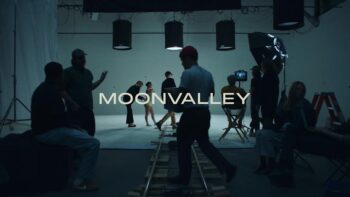By Gary Symons
TLL Editor in Chief
Can generative AI be ethical, and respect the copyright of human creators?
The AI research company Moonvalley says it can, and has just launched a new AI model called Marey that creates video, but does so while respecting the copyright of the content with which it was trained.
Given the global concern over alleged copyright violation by companies developing generative AI, the release of Marey could be a significant development for the entertainment, advertising and marketing industries.
Moonvalley says it launched Marey as a foundational AI video model designed specifically for professional film, VFX, and commercial production. The launch comes at a time of heightened scrutiny over the legal and ethical implications of generative AI, particularly regarding the use of copyrighted material to train large models.
Marey is being marketed as the first fully licensed AI video solution intended for high-end production. Moonvalley says it is designed to give filmmakers, studios, and brands a level of precision control and legal assurance that has so far been elusive in the generative video space.
The company also announced beta access to Voyager, a production platform designed to unlock Marey’s full capabilities for complex workflows.
“We built Marey because the industry told us existing AI video tools don’t work for serious production,” said Moonvalley CEO and co-founder Naeem Talukdar in a statement. “Directors need precise control over every creative decision, plus legal confidence for commercial use. Today we’re delivering both, and proving that the most powerful AI comes from partnership with creators, not exploitation of their work.”
Moonvalley’s announcement is positioned as a direct response to the growing backlash against AI developers accused of training models on copyrighted content without consent.
Several high-profile lawsuits have been filed by artists, authors, and media companies over the past few years alleging that major AI firms violated intellectual property rights in building their models.
Opinion: Grok 2 Shows We Need New Copyright Laws for AI and Social Media
These cases have sparked calls for regulatory oversight and prompted a shift in how AI companies source training data. For example, the EU and the UK have both drafted new copyright legislation to deal with threats from generative AI.
Moonvalley claims that Marey was trained exclusively on licensed, high-definition content, developed in close collaboration with filmmakers at the company’s in-house studio, Asteria.
The six-month research effort included alpha testing with external partners and focused on enabling precise control over motion, characters, objects, and scene composition. Moonvalley says those are features often missing from existing generative AI tools.
“Traditional AI video often reduces filmmakers to consumers typing prompts into black box systems with little creative control,” said Mateusz Malinowski, Moonvalley’s Chief Scientific Officer and a former DeepMind researcher. “With Marey, we aim to give directors the same level of control they expect on set.”
The launch reflects a broader push within the AI industry to differentiate ethically sourced and legally compliant models from those facing litigation and public criticism.
For example, YouTube announced a program in 2023 in which it teamed up with a small group of music artists to offer AI-generated versions of their singing voices as soundtracks for creator videos. It’s doing that by using a music generation model created by Google’s AI division to produce unique 30-second clips in a limited trial run.
The artists included in that trial included Alec Benjamin, Charlie Puth, Charli XCX, Demi Lovato, John Legend, Sia, T-Pain, Troye Sivan and Papoose.
However, other initiatives have heightened concerns that generative AI will replace musicians, writers and authors.
Disney and NBCUniversal are suing AI company Midjourney, accusing it of enabling copyright infringement on a massive scale through its AI image generator tech. The two Hollywood heavyweights have accused the firm of ignoring its previous requests to stop violating their intellectual property rights.
“Midjourney is the quintessential copyright free-rider and a bottomless pit of plagiarism,” the complaint reads in the first legal action that major Hollywood studios have taken against a generative AI company.
Opinion: Timbaland’s New AI Pop Star ‘TaTa’ Ushers in the Age of the Uncanny Valley
In the music industry the company Stage Zero — co-founded by rapper and producer Timbaland with Rocky Mudaliar and Zayd Portillo — is essentially combining the ‘Virtual Influencer’ concept that TLL wrote extensively about in 2020, with new AI tools that allow users to create music and lyrics with generative AI, and then pair that music with a lifelike, AI-created avatar.
Timbaland might quarrel with that description, as he insists TaTa is not actually an avatar, but an artist in her (or its) own right.
“I’m not just producing tracks anymore,” Timbaland said in a statement. “I’m producing systems, stories, and stars from scratch. [TaTa] is not an avatar. She is not a character. TaTa is a living, learning, autonomous music artist built with AI. TaTa is the start of something bigger. She’s the first artist of a new generation. A-Pop is the next cultural evolution, and TaTa is its first icon.”
However, Stage Zero and similar companies are not well regarded by music labels, and particularly by the so-called Big Three, those being Sony, Universal Music Group (UMG) and Warner Music Group (WMG). Both Stage Zero and the AI company Suno are being sued by the Big Three over the use of their content to train their algorithms.
Moonvalley’s program Marey is among the first to put copyright at the forefront of its offering. By branding Marey as both a technological breakthrough and a legal safeguard, Moonvalley is betting that the future of AI in entertainment lies not just in innovation, but in creative partnerships based on trust.
